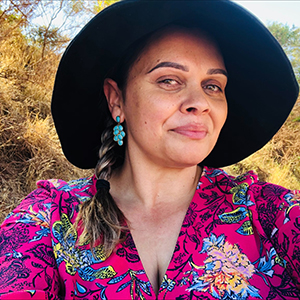Allira Cutmore
 Allira Cutmore
Allira Cutmore
On the right side of youth support
Growing up on the “wrong side of the bridge” in Moree, NSW, left a lasting legacy for Gamilaroi woman Allira Cutmore.
“The effects of colonisation; the inter-generational grief and loss and trauma, as well as the inequality and racism, was in your face,” says Allira. “I saw it and experienced it myself in that neighbourhood.”
But a profound sense of identity and family connection also prevailed. “My interest in social justice began there, at an early age,” Allira says. “I grew up hearing about the Freedom Rides and our local history; about how our medical and legal services had come about because elders in our community had stood up and demanded them. My aunties and uncles nurtured my interest and I began marching on NAIDOC Week and during other community events, advocating for Aboriginal rights, to help make things better. I am proud of who I am and that history.”
Ever since primary school Allira had wanted to play her part in empowering the community she loved. “Having family members that battled with alcohol and mental health and drugs and crime, I wanted to help people make better choices,” she says.
Leaving school in Year 11 and becoming a teenage mother challenged that vision, but Allira was determined and ambitious. “When my first child was one-month-old I was offered an administration position at one of the local employment agencies, but I could only do it after my Mum and Nan offered to look after the baby,” she says. “It was my first job and I went on to work for the council, Centrelink and in housing and health roles.”
Along the way, Allira developed a specific interest in mental health, and devised a way she could harness her unique life experiences. “I did drugs as a teenager, I had a teenage pregnancy, at times in my life I have been a single Mum and had experiences of mental health and family members in jail and dying by suicide,” she said. “That’s why I began the Bachelor of Social Work at UNE – to gain the formal qualifications that would allow me to give back and help others.”
But it was far from easy. Allira started studying full-time, but had four children, including twins, during the course of her degree, and at times combined parenting, study and part-time work. “There was obstacle after obstacle to me finishing – at one point I had three children in the space of 12 months – but I just had to do it,” she says. “I just knew the degree would enable me to do what I wanted to do with my life.”
Rotary Club and Puggy Hunter scholarships helped ease the financial burden as Allira’s partner also sought to complete his electrical apprenticeship. Despite the constant challenges, Allira achieved consistently high results and completed an allied health cadetship with Hunter New England Health (with the Armidale Mental Health team) on her way to becoming one of Australia’s few Indigenous social workers.
Now she and her family live on the other side of the country, where her partner works for BHP and she is the sole Headspace youth wellbeing worker servicing the town of Newman. “Technically we are an outreach pilot of Headspace, designed to meet the challenges of life in a rural and remote community. It’s the first time I’ve lived in a mining town and I support young people with face-to-face consultations and act as a service broker to support their health needs.
“Indigenous people here are still very strong in their cultural ways and lore and language. As a Murri from Moree, NSW, my cultural knowledge is valued but our Aboriginal cultures are very different. It’s more about me learning from them.”
Outings in search of honey ants and bush medicine are already forging new relationships as Allira engages with local Indigenous people, and she is hopeful it will lead to more young people in need reaching out.
“It definitely is an advantage understanding how Aboriginal families and communities work,” she says. “The effects of colonisation are still being felt and are unique to each region and even each Australian town. It’s different to what I grew up with, but many of the challenges are the same – the low self-esteem among young people and experience of trauma.”
At Newman, Allira is an important health support to both Indigenous and non-Indigenous clients. However, down the track she dreams of establishing her own Indigenous social work practice – offering counselling, advocacy, research, and policy and community development – to deliver culturally appropriate support.
“I understand that trauma and history … I have lived through it,” says Allira. “And I understand how negative stereotypes and division can come about in society and give birth to prejudice and racism. I have always said that my Aboriginality is my greatest asset and now I can combine that with my professional experience.”

